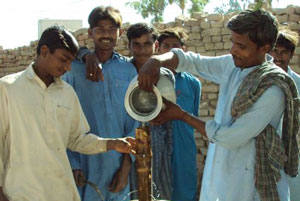
The availability of fresh water in Pakistan was already a serious concern and the worry is that future accessibility will decline dramatically in the coming years.
Credits: Caritas Pakistan
By Mumtaz Bashir Bhatti, Caritas Pakistan
Pakistan contributes little to global warming – responsible for one 35th of the world’s average carbon dioxide emissions. Temperatures in the country’s coastal areas have risen from 0.6 to 1 degree centigrade since the early 1900s. Over the last 40 years, precipitation has decreased 10 to 15 percent in the coastal belt and in the arid plains, while there has been an increase in summer and winter rains in the north.
The changing climate has had a negative impact on agricultural production and on export industries such as food, textiles and fisheries. Low-lying areas on the coast are at risk of being inundated and the homes of millions of people will be flooded. Over-grazing, over-fishing, and deforestation for fuel are common in rural areas and have further contributed to the depletion of fresh water.
Climate experts in Tharparkar, Pakistan are drawing attention to the severe water scarcity throughout the country. The availability of fresh water was already a serious concern and the worry is that future accessibility will decline dramatically in the coming years.
Nagarparkar is 400 km away from Hyderabad and 650 km away from Karachi, situated at Tharparkar district on the India-Pakistan Border. Anticipating this mounting water problem, in 2001, Caritas Pakistan Hyderabad (CPH) constructed four dams and 18 water ponds. As a result, there was an increase in the water table of the area by 40 feet. Now, 40 wells are functioning properly in the surrounding area of Karoonjhar Hill – Nagar Parkar city, allowing farmers to start cultivating vegetables and other short-term crops. Also that year, a water resistant fruit tree plantation campaign was carried out in the same areas. Five thousand mango, cheeku, amrood, jamin, and lemon trees were planted to provide fresh fruit to the communities, generate a source of income, and to make the area green.
In other areas of the desert, families were purchasing vegetables from the local market that were heavily dosed with chemicals. According to a Caritas survey, this caused several illnesses, especially to children. Caritas began teaching the communities about water conservation techniques through their Kitchen Gardening programmes. By using the wastewater for kitchen gardening at household level, the women were able to grow fresh vegetables at home. Ms. Helen Heeri, an active volunteer of Caritas, says that “the new method is so beautiful and through kitchen gardening we are saving Rs. 1500 per month (USD 17).”
To further improve the health of women, Caritas Pakistan Hyderabad introduced fuel-efficient stove cooking technology to reduce wood consumption by 50 percent, which saved cooking time and reduced air pollution. Furthermore, since these families are highly dependent on animal rearing, CHP helped care for the local livestock through animal vaccination camps and livestock management seminars.
Unfortunately, environmental degradation will likely continue to be pervasive in Pakistan. However, with the help of Caritas Pakistan Hyderabad, families are learning to adapt to the current situation and are being prepared for the increasing difficulties that lie ahead.
Mumtaz Bashir Bhatti is Livelihood Programme Coordinator for Caritas Pakistan Hyderabad (CPH)
